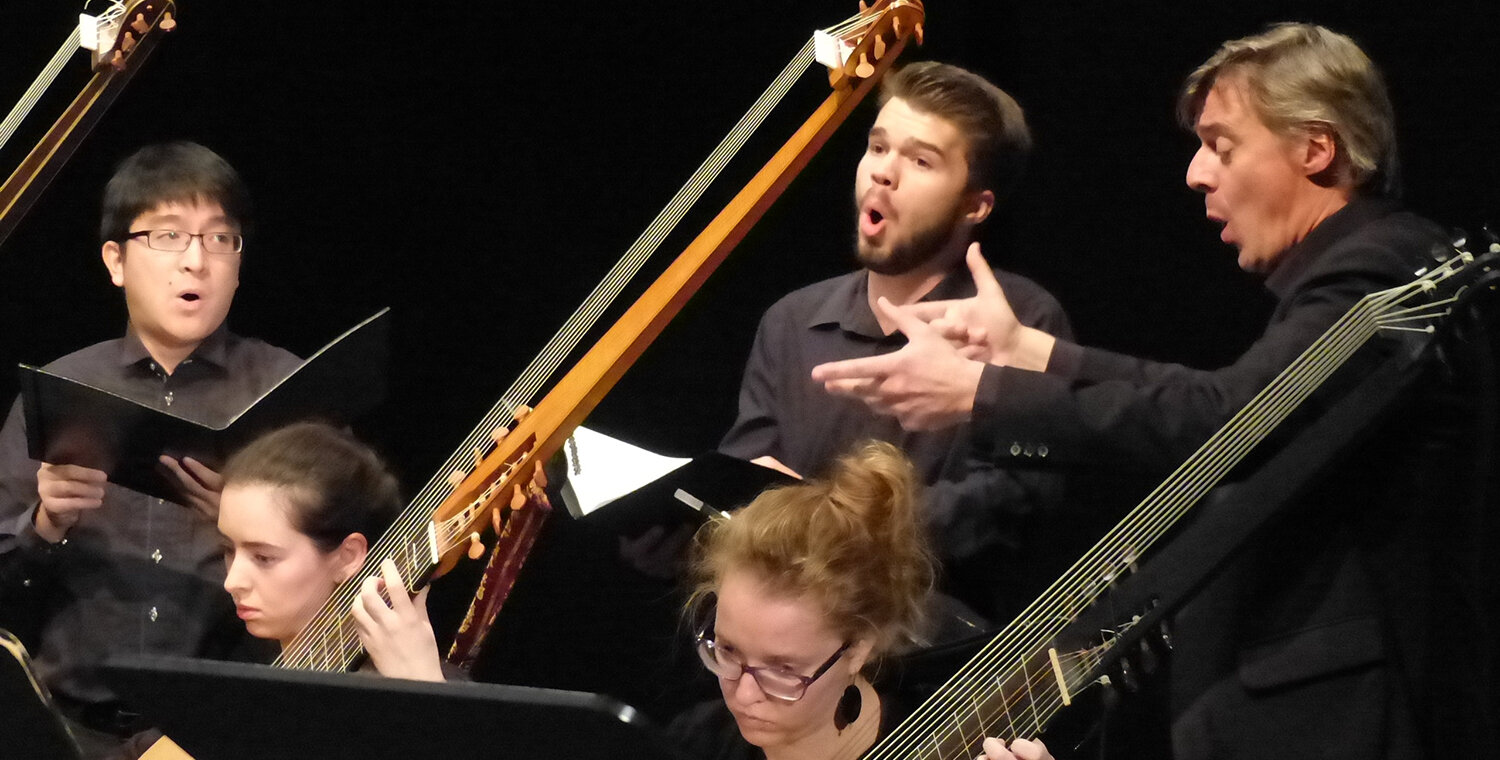Bachelor Degree in Early Music
Young musicians from all over the world come together at the Institute for Performance Practice (formerly Early Music) at the Trossingen University of Music. They are united by the joy of exploring and discovering music from the Renaissance to the Romantic period. They are passionately dedicated to making music on instruments of historical design. Together with their world-renowned lecturers, they explore the sound of past epochs and transport it into the here and now. In addition to a broad canon of subjects and the study of old textbooks, they question listening expectations and develop new individual approaches to interpretation. Numerous historical instruments are available to students in the university loan pool. The guiding principles of the programme are science and practical relevance, historical performance practice and the joy of playing.
As a place of study, Trossingen is characterized by a both demanding and friendly environment with a creative working atmosphere and is not characterized by competition but by mutual inspiration and appreciation.
Areas of Study
- Artistic focus
- Artistic-practical context
- Instrumental/vocal pedagogy
- Profession and career
- Elective modules
In masterclasses and intensive ensemble practice, students participate in chamber music and consort groups, baroque orchestras, Renaissance and vocal ensembles, as well as dance and stage work.
Instruments
- Voice
- Historical keyboard instruments (harpsichord, historical organ, fortepiano, clavichord)
- Violin / Viola, Violoncello, Viola da gamba
- Lute / Theorbo / Guitar
- Oboe, Bassoon / Dulcian, Zinc
- Recorder, transverse flute
- Trumpet, Clarinet, French Horn
Minor subjects
- Improvisation
- Basso continuo, historical theory of musical composition, analysis of works
- Ear training
- Performance practice
- Historical tuning
- Study of instruments, notation and sources
- Music history, musicology lectures and seminars
- Baroque dance, scenic performance and body and movement work for singers
- Pedagogy, methodology
BA-III-20-1A: Historical keyboard, lute and guitar instruments, artistic-pedagogical profile
BA-III-20-1B: Historical keyboard, lute and guitar instruments, podium profile
BA-III-20-2A: String and wind instruments, artistic-pedagogical profile
BA-III-20-2B: String and wind instruments, podium profile
BA-III-20-3A: Voice, artistic-pedagogical profile
BA-III-20-3B: Voice, podium profile
(all Module Handbooks are available only in German)

Bachelorstudiengang Alte Musik
Am Institut für Aufführungspraxis (ehemals Alte Musik) der Staatlichen Hochschule für Musik Trossingen kommen junge Musiker*innen aus aller Welt zusammen. Sie verbindet die Freude an der Erkundung und Entdeckung der Musik von der Renaissance bis in die Romantik. Mit voller Leidenschaft widmen sie sich dem Musizieren auf Instrumenten historischer Bauart. Gemeinsam mit ihren weltweit geschätzten Dozierenden erkunden sie den Klang vergangener Epochen und transportieren ihn ins Hier und Jetzt. Neben einem breiten Fächerkanon und dem Studium alter Lehrwerke hinterfragen sie Hörerwartungen und entwickeln neue individuelle Interpretationsansätze. Im Hochschul-Leihpool stehen den Studierenden zahlreiche historische Instrumente zur Verfügung. Die Leitlinien des Studiums sind Wissenschaft und Praxisnähe, Historische Aufführungspraxis und Spielfreude.
Trossingen als Studienort zeichnet sich aus durch ein forderndes und zugleich freundschaftliches Klima mit einer kreativen Arbeitsatmosphäre, die nicht von Konkurrenz, sondern von gegenseitiger Inspiration und Wertschätzung geprägt ist.
Studienbereiche
- Künstlerischer Schwerpunkt
- Künstlerisch-praktischer Kontext
- Instrumental-/Gesangspädagogik
- Beruf und Karriere
- Wahlmodule
In Meisterkursen und intensiver Ensemblepraxis nehmen die Studierenden an Kammermusik- und Consortgruppen, dem Barockorchester, Renaissance- und Vokal-Ensembles sowie an Tanz- und Bühnenarbeit teil.
Instrumente
- Gesang
- historische Tasteninstrumente (Cembalo, historische Orgel, Fortepiano, Clavichord)
- Violine/Viola, Violoncello, Viola da Gamba
- Laute/Theorbe/Gitarre
- Oboe, Fagott/Dulcian, Zink
- Blockflöte, Traversflöte
- Trompete, Klarinette, Horn
Nebenfächer
- Improvisation
- Generalbass, historische Tonsatzlehre, Werkanalyse
- Gehörbildung
- Aufführungspraxis
- historische Stimmungen
- Instrumenten-, Notations- und Quellenkunde
- Musikgeschichte, musikwissenschaftliche Vorlesungen und Seminare
- Barocktanz, szenische Darstellung sowie Körper- und Bewegungsarbeit für Sänger
- Pädagogik, Methodik
BA-III-20-1A: Historische Tasten-, Lauten- und Gitarreninstrumente, künstlerisch-pädagogisches Profil
BA-III-20-1B: Historische Tasten-, Lauten- und Gitarreninstrumente, Profil Podium
BA-III-20-2A: Streich- und Blasinstrumente, künstlerisch-pädagogisches Profil
BA-III-20-2B: Streich- und Blasinstrumente, Profil Podium
BA-III-20-3A: Gesang, künstlerisch-pädagogisches Profil
BA-III-20-3B: Gesang, Profil Podium
Kurz-Infos zum Studium
| Regelstudienzeit: | 8 Semester |
| Studienbeginn: | Winter- und Sommersemester (Musikdesign nur WS) |
| Bewerbungszeitraum: | WS: 01.03.-01.04. SS: 01.10.-01.11. |